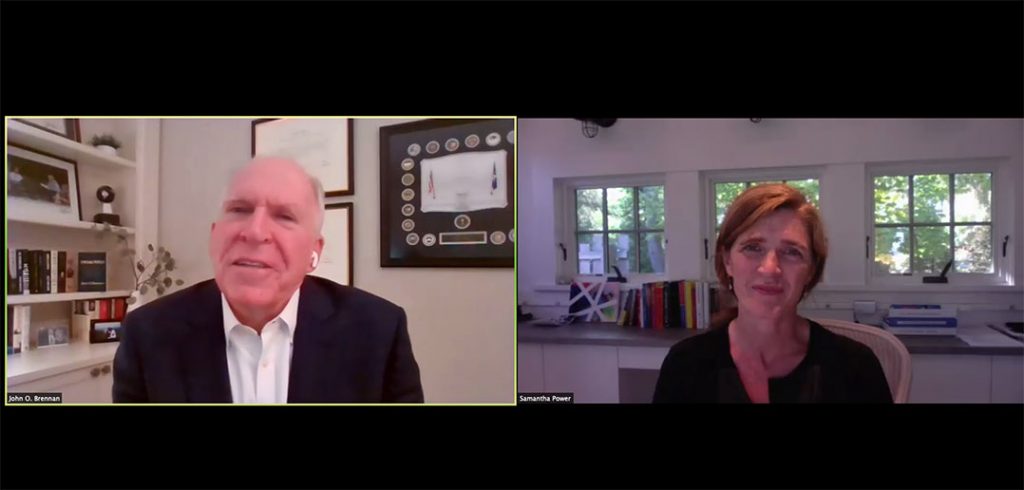John Brennan, FCRH, ’77, said in an online conversation on Oct. 14 that although these might seem like challenging times for anyone interested in serving their country, he still believes patriotic Americans can find a home in the intelligence community.
“One of the reasons I was attracted to join the intelligence community was because it is designed to be independent and objective, not partisan,” said Brennan, a former CIA director and assistant to the president for homeland security and counterterrorism.
In a wide-ranging conversation on Zoom with Samantha Power, former U.S. ambassador to the United Nations, Brennan covered everything from the 2020 election and current threats against the country to things he would have done differently during his time at the CIA. The talk was timed around the release of his new memoir, Undaunted: My Fight Against America’s Enemies, At Home and Abroad (Celedon Books, 2020).
When it comes to service, he recalled how once a month, he administered an oath of allegiance to brand new CIA officers.
“I would tell them, ‘Working in the Washington D.C. area in national security, you’re going to be the target of the wrath of those from one side or the other. You need to really carry out your responsibilities as best as you can, because the American people depend on it,” said Brennan, who is a distinguished fellow for global security at Fordham’s Center on National Security.
In fact, Brennan said that he felt that encouraging people to consider public service was so important, he wrote the memoir even though President Donald Trump refused to grant him access to personal records from his time at the agency.
“I could have pursued some type of litigation or appeal process that I think would just have dragged it out,” he said. “I decided to move forward and try to recollect as much as I could and try to talk to some of my former colleagues.”
In recounting his career, Brennan noted that his intense hatred for partisan politics made his entry into the CIA more eventful than necessary.
In the memoir, he describes how he was required to submit to a lie detector test before being admitted to the agency. Asked by an agent administering the polygraph test whether he’d lied recently, he admitted he’d lied to his observant mother about attending Mass.
That was embarrassing enough, he said, but then he was asked whether he’d supported any groups dedicated to overthrowing the American government. Brennan said he flashed back to 1976, when he’d voted for Gus Hall, who was running for president as a Communist. It was his first time voting for president, he said, and he’d already become so turned off by partisan politics, that he cast a vote for Hall as a form of protest.
“I knew that if I were to say no to the polygrapher with that on my mind, the machine would have gone bonkers. So, I decided to reveal that in a very anxious manner. I didn’t know how he was going to react to it,” he said, noting that he assured the agent that it was a one-off protest.
“I think he saw the look of fear in my face, and he said, ‘It is your right as an American citizen to vote for whoever you want, and that will not be held against you in anyway on your application.’ I just felt this great surge of elation. … [It] really reinformed my determination to work for the CIA.”
He credited his perspective and worldview to his parents, who immigrated to the United States from Ireland.
“My father, who came to the United States at the age of 28 in 1948, always impressed upon my brother, my sister, and me just how special it as to be an American citizen. He said he strove his entire life to come to the land of freedom and opportunity, and we should never take for granted that we’re American citizens,” he said.
“My parents were very, very instrumental in making sure that I had a north star where honesty, decency, dignity, and understanding the difference between right and wrong guided me.”
To watch the conversation, visit the center’s webpage.

